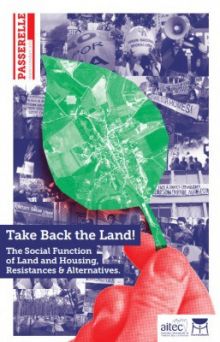Take Back the Land! The Social Function of Land and Housing, Resistances & Alternatives

This edited volume shares a collectively told story, written in recent years, of the social function of property and ownership. It aims to support struggles for rights to land, to the city and to housing in light of a global tenure insecurity crisis.
The book not only highlights how the most marginalized and poor are vulnerable to a lack of security and adequate housing, but also emphasizes the huge economic and social potential that secure, sustainable and affordable housing can unleash for improving people’s wellbeing and dignity. Authors provide different angles to an in-depth investigation on the meaning of the social function of land and housing. This raises questions about responsibilities and roles of different agents and their respective resources, as well as the means – particularly of land right activists and networks – to challenge the status quo. The cases used to illustrate this analysis include reconstruction in Chile after the 2010 earthquake, where the private sector played a central role in using this disaster to execute displacements and seize profit-making opportunities. Port-au-Prince faced huge challenges related to the lack of planning and legal landowners before the disaster, making reconstruction claims by occupants very difficult and leading to further construction by the occupants themselves.
The second part of the book focuses on the housing issue as a trigger of rebellions. Starting off with an excerpt from the book Rebel Cities by David Harvey, the chapters provide compelling readings on cases such as Bahrain and the techniques the ruling Khalifa family applied to turn large proportions of public land into private land; Morocco, where the palace’s annual budget is said to exceed the combined one of four ministries; and land grabbing in Mali, where the state gave away land based on geographical information from satellite data.
Countries like Brazil and Colombia, however, highlight that progress is being made in designing urban policies and legal frameworks for fair, democratic and sustainable cities, but that their effective implementation requires traditional urban movements to link up with new ones. Particularly interesting in this regard are the chapters that focus on cooperative, communal and collective forms of land tenure, which are crucial to strengthen the right to decent housing. Well-known and successful examples are the Asian Coalition for Community Action and the Community Organisations Development Institute in Thailand. These show how documenting, highlighting and strengthening collective forms of land tenure and land use can be a key strategy for livelihood improvement and long-term capacity building.
In sum, authors provide strong arguments that the social function of property and land essentially signifies an integration of human rights. Also crucial is a shift away from understanding private property as an individual right to economic assets, and towards an appreciation of collective rights that enhance social wellbeing, equity, justice, gender equality, and environmental sustainability.
Available from:
Book note prepared by Julia Wesely
Search the Book notes database
Our Book notes database contains details and summaries of all the publications included in Book notes since 1993 - with details on how to obtain/download.
Use the search form above, or visit the Book notes landing page for more options and latest content.
For a searchable database for papers in Environment and Urbanization, go to http://eau.sagepub.com/

